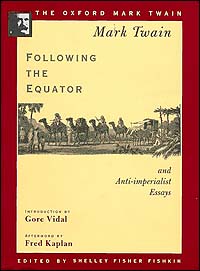
Having now read the first twenty volumes of the Oxford Mark Twain,
some of which contain more than one of his books, I am prepared to
offer a preliminary verdict on his career. And it is this: Mark
Twain is among the all-time greatest travel writers and memoirists.
His fiction is okay. If I had to rank the Twain books I've read so
far I would probably put Life on the
Mississippi first, followed by A
Tramp Abroad and Roughing It.
His last travel book,
Following the Equator, would come next. And then I guess I'd
finally pick a novel. Probably Connecticut
Yankee, and even that's more interesting for its social commentary
than for its literary value. It's also the novel of Twain's whose
narrative voice is closest to the voice Twain uses in his travel writing.
In Following the Equator, Twain takes a voyage around the world,
with extended stays in Australia, India, and South Africa (to give readings
to pay off his massive debts, though this aspect is, shall we say,
underplayed). As always, I found the subject matter of Twain's travelogue
fascinating — once again, while I can hop on a plane and go to
Australia, I can't go to 1890s Australia. This time there are
even photographs, which are neat because, hey, it's a photo of
Mark Twain switching boats on his way from Christchurch to Auckland.
(The pen-and-ink illustrations in the earlier books had more aesthetic
value, however. Equator does have a few drawings to go with
the photos, and some muddy paintings rendered in halftone.) But it's
not just about distant lands in distant times. It's the wittiness of
the writing, the meandering in and out of amusing anecdotes, the random
observations along the way.
It occurred to me as I was finishing the book that I should try to
isolate some of the distinguishing characteristics of Twain's style of
humor. I think I found one, at least. A couple of examples:
|
(about how he'd conduct the Boer war)
I served two weeks in the beginning of our Civil War,
and during all that time commanded a battery of infantry composed of twelve
men. General Grant knew the history of my campaign, for I told it him.
I also told him the principle upon which I had conducted it; which
was, to tire the enemy. I tired out and disqualified many battalions,
yet never had a casualty myself nor lost a man. General Grant was
not given to paying compliments, yet he said frankly that if I had
conducted the whole war much bloodshed would have been spared, and
that what the army might have lost through the inspiriting results
of collision in the field would have been amply made up by the
liberalizing influences of travel. (680)
(about the discovery of diamonds in South Africa)
In a Boer's hut out in the wide solitude of the Plains,
a traveling stranger noticed a child playing with a bright object, and was
told it was a piece of glass which had been found in the veldt. The stranger
bought it for a trifle and carried it away; and being without honor,
made another stranger believe it was a diamond, and so got $125 out of
him for it, and was as pleased with himself as if he had done a
righteous thing. In Paris the wronged stranger sold it to a pawnshop
for $10,000, who sold it to a countess for $80,000 [...]
The news flew around, and the South African diamond-boom
began. The original traveler — the dishonest one — now remembered
that he had once seen a Boer teamster chocking his wagon-wheel with
a diamond as large as a football, and he laid aside his occupation and
started out to hunt for it, but not with the intention of cheating
anybody out of $125 with it, for he had reformed. (700-1)
|
What these excerpts have in common (and they share this in common
with many other bits of Twain's) is that their comedic value rests
in the speaker offering the Wrong Explanation. It helps when the
explanation is funny; members of a retreating army explaining that
they're trying to tire out the enemy was a tired gag long before
the nineteenth century, but having them claim they're trying to
become more cosmopolitan by seeing more of the world is a good one.
The innocent explanation that the diamond hunter "had reformed" is
also hilarious for its simplicity. It seems to me that this
technique, along with others such as exaggeration (I recall an
early bit, possibly from the very first book, in which Twain says
his neighbor was trying to learn to play the accordion so he went
over and burnt down his house) and playing with the emphasis in
a sentence, creates a sort of Twain-speak that is in its way as
distinctive as John Allison's
Scary-Go-Round-speak. And just as
Scary-Go-Round-speak is the main attraction of Scary Go Round,
Twain-speak is, at least for me, the main attraction of Twain's
work. The travel books and memoirs have it; the novels mostly
don't.

Return to the Calendar page!
|


